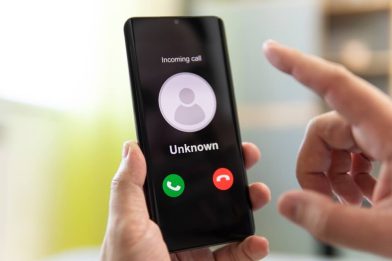The Truth About Prime Drinks: Is Prime Energy and Prime Hydration Good for Kids?
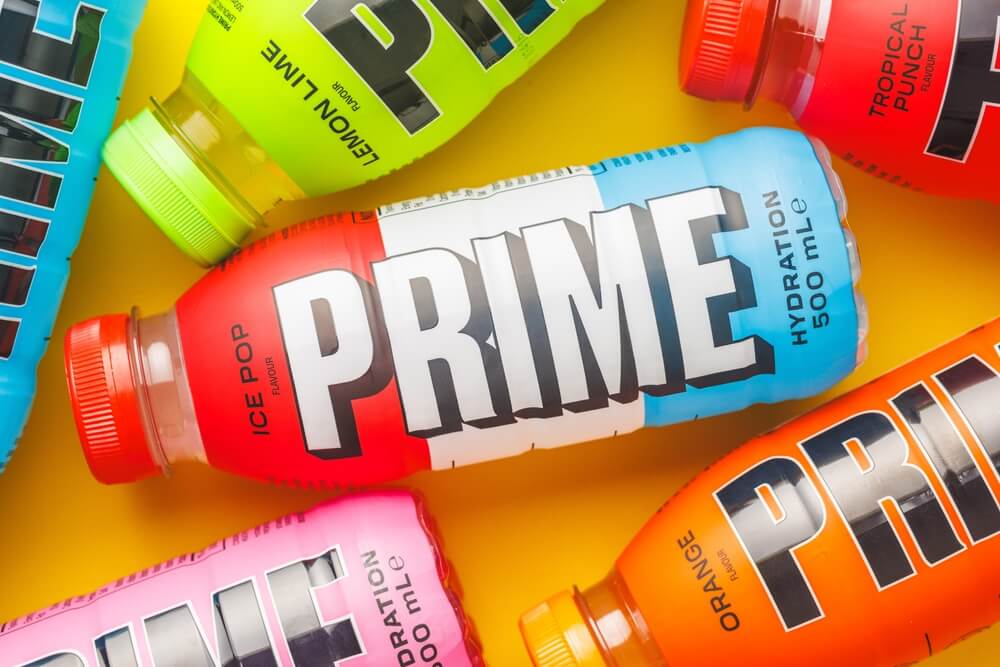
Prime Hydration and Prime Energy are more popular than classic soft drinks, especially among children and young generations in general, leading many parents to wonder: “Is Prime good for kids?” and “Can kids drink Prime safely?” This guide is here to explore the answers.
Contents:
- What Are Prime Drinks?
- Prime Hydration and Prime Energy — What’s the Difference?
- The Main Things You Should Know About Prime Drinks
- So, Are Prime Drinks Good for Kids?
- What If My Child Is Obsessed and Really Wants to Try It?
- What Are the Healthiest Hydrating Drinks for Active Kids?
- FAQs
What Are Prime Drinks?
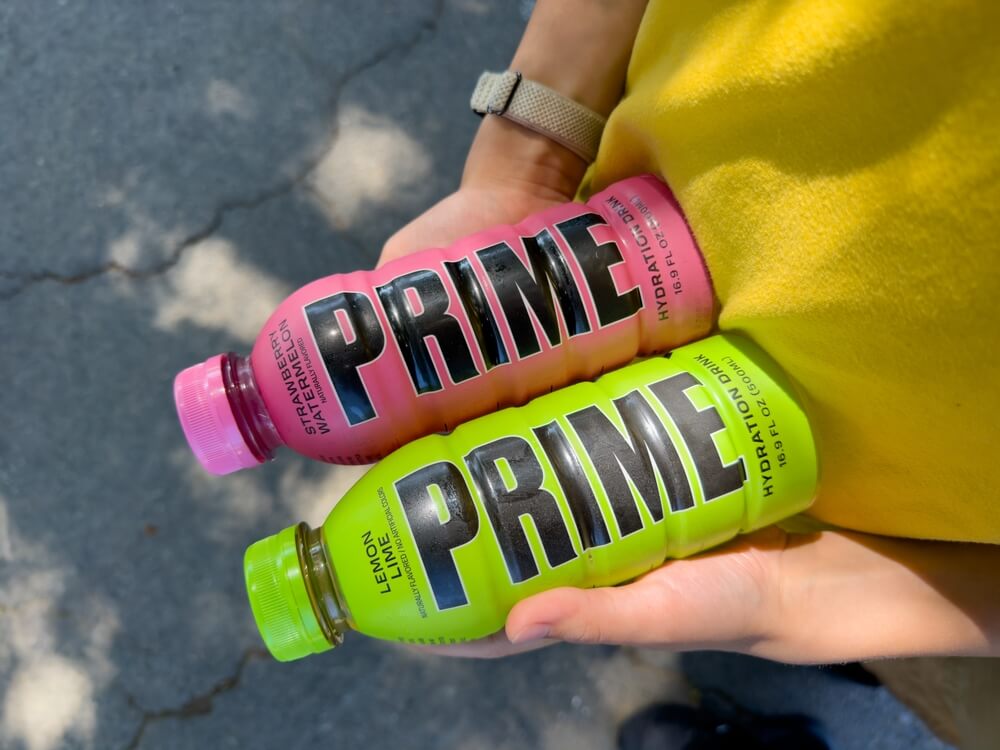
ZikG/Shutterstock.com
Let’s kick off with an introduction for those who have yet to become fully familiar with the Prime drink brand. Prime drinks were created by two very popular YouTubers named Logan Paul and KSI. Logan Paul, known for his energetic content and vast social media following, teamed up with KSI, a multi-talented entertainer and musician, after their longstanding rivalry transformed into a partnership.
This collaboration allowed them to leverage their millions of fans worldwide, leading to an immediate surge in interest. Upon its launch, kids of various ages clamored to try Prime Hydration drinks, resulting in significant shortages and price increases. In schools, children were even observed trading Prime drinks, highlighting its status as a sought-after product.
The brand’s success can be attributed to the founders’ marketing strategies and their ability to connect with their audience. As Prime continues to evolve, it stands as a testament to how Logan Paul’s and KSI’s influence can create a popular beverage that resonates deeply with consumers, ensuring its place in the competitive market for years to come.
Prime Hydration and Prime Energy — What’s the Difference?
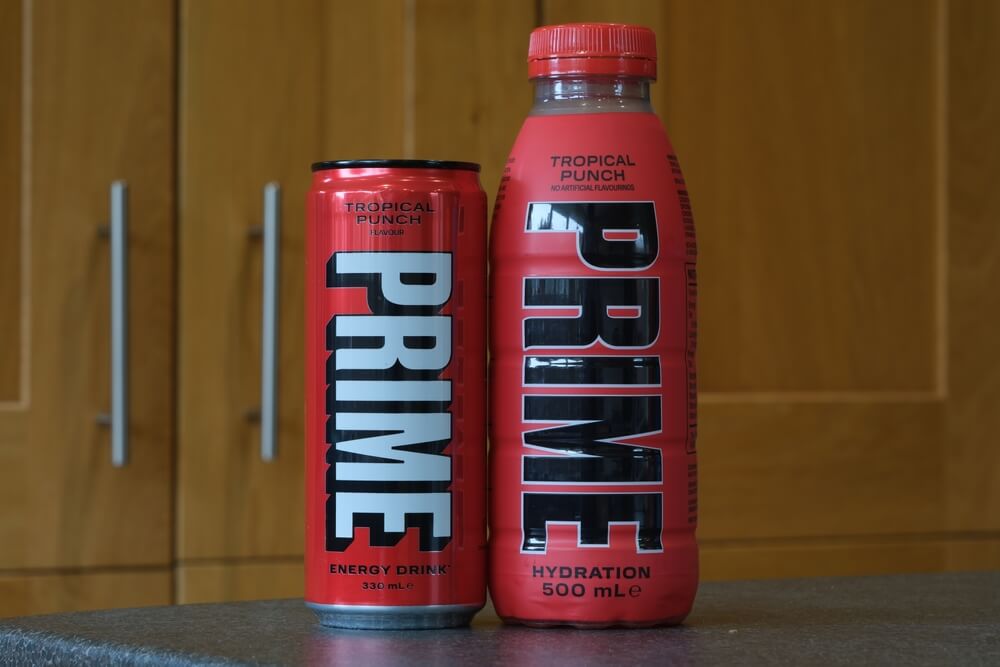
Prime Energy and Prime Hydration. Matthew Nichols1/Shutterstock.com
One of the most important things to know about Prime drinks is that they’re split into two main categories: Hydration and Energy. As the name suggests, Prime Hydration drinks are marketed as helping to hydrate the consumer, made up of mostly water, coconut water, and artificial sweeteners, along with vitamins and electrolytes, similar to Gatorade and similar drinks.
Prime Energy, meanwhile, is an energy drink with a very high dose of caffeine per serving. Indeed, a single can of Prime Energy can contain up to 200mg of caffeine, which is equivalent to about five cans of Coca-Cola or a few cups of coffee. Unlike Prime Hydration, which is flat, Prime Energy is also carbonated. It contains artificial sweeteners and flavorings.
The Main Things You Should Know About Prime Drinks
In the ever-expanding market of beverages, parents often find themselves questioning whether Prime Drinks—both Prime Energy and Prime Hydration Drinks—are a suitable choice for their kids. It’s imperative to explore this topic, considering potential causes of concern, from allergic reactions to the impact on chronic conditions.
One primary worry is the potential exacerbation of symptoms, especially in children with ADHD. The question of whether Prime Drinks are advisable during pregnancy adds an additional layer of complexity.
As parents, paying attention to warning labels becomes crucial. These labels often provide essential information about the contents of the drink, including antioxidants, which, while often touted for their health benefits, may have their own set of considerations.
Understanding the FDA’s stance on Prime Drinks for children is pivotal in making informed decisions. Are these beverages genuinely conducive to a child’s well-being, or do they pose risks that parents should be wary of?
There are several key takeaways that parents need to know about Prime beverages:
- High Caffeine. The biggest fact for parents to know about Prime is the massive amount of caffeine included in Prime Energy. It’s a colossal amount of caffeine per serving, far above the recommended daily limits for children. Indeed, the brand even states on its own Energy labels that the product isn’t suitable for anyone under 18.
- BCAAs. Another big thing to note about Prime is the presence of BCAAs (Branch Chain Amino Acids) in each can. The way this is marketed is cleverly designed to make parents and kids think that the drinks can aid with muscle building and nutrition. However, these amino acids provide no extra special benefits for consumers.
- Artificial Sweeteners. Additionally, Prime markets itself as being free of any added sugar, but it does make use of large amounts of artificial sweeteners, like sucralose. Many experts are concerned about the possible risks to children, in particular, consuming these sweeteners in large quantities.
Take a look at this table to find out about some of the potentially harmful ingredients in Prime Energy and how each could affect kids’ bodies:
| Ingredient | Effect |
| Artificial sweetener (sucralose) | May possibly affect insulin sensitivity—more research is needed |
| Caffeine | Can cause anxiety, insomnia, abnormal heart rate, depression, dehydration, and more |
| BCAAs (branch chain amino acids) | Linked to disturbed sleep |
| High levels of B6 and B12 | Can result in too high an intake of these vitamins if the child is eating other fortified foods |
So, Are Prime Drinks Good for Kids?
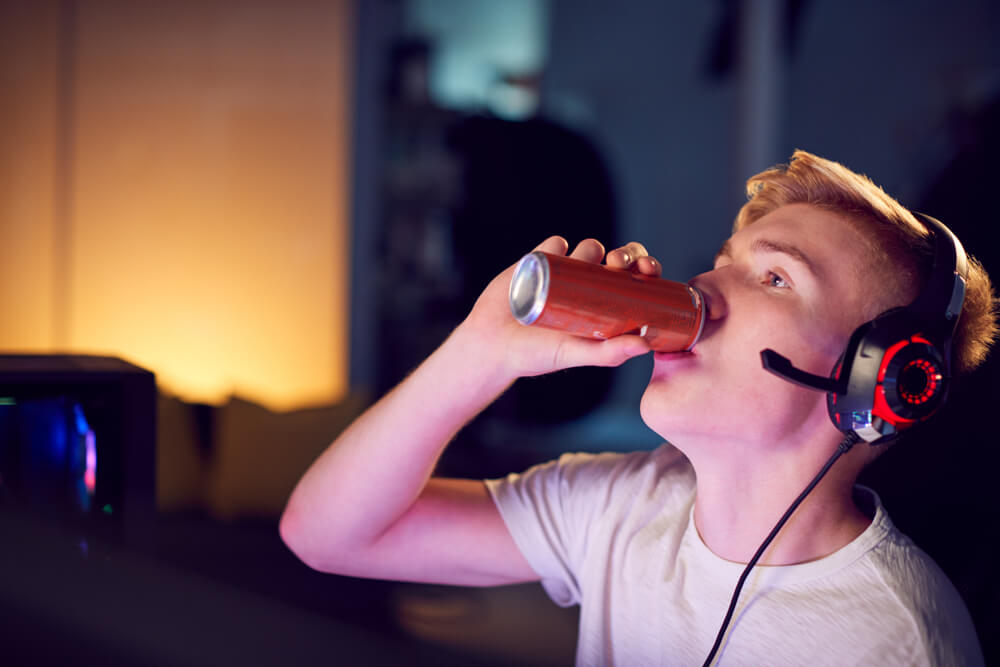
Monkey Business Images/Shutterstock.com
A lot of experts say that Prime drinks contain ingredients that are beyond safe levels for children. Even the brand agrees, noting on its packaging that Prime Hydration drinks aren’t suitable for anyone under 15 and Energy drinks are only for those above 18.
As a parent, it’s understandable you’d like more information about the sports drinks your kid wants to consume. Here’s an overview of Prime drinks, with a special focus on the potential risks of their ingredients:
- Energy
Just like other similar drinks, the idea of this beverage is to increase your energy levels. A single can of this drink, whether you pick Tropical Punch or the other seven sweet flavors available, contains 200 milligrams of caffeine—and you can imagine how that boost can affect children. Each can include 355 mg of electrolytes, focusing on boosting your capabilities of handling physical activity. But these are doses for adults, and children can find themselves becoming too energetic after drinking Prime Hydration drinks.
The adverse effects could include getting nervous and anxious, and even an accelerated heartbeat. That’s all due to high energy focus and caffeine content.
The ingredient lists include carbonated water, coconut water, and many vitamins and minerals. Although there’s no sugar, you can expect erythritol, which makes Prime Energy drinks similar to sweet drinks. Most ingredients actually come from artificial sources, which is worrying by itself.
- Hydration
Those who don’t enjoy caffeinated beverages have the Prime Hydration drinks available. You’ll stay free from caffeine consumption, and get a bottle instead of a can.
Each bottle is 500 mg and packed with 534 milligrams of electrolytes. About 10% of the water content is from coconut, and you get a pack of artificial vitamins, such as the BCAA or branched-chain amino acids.
Now, let’s discuss the potential side effects that these Prime Hydration drinks might have. For starters, there’s the vitamin toxicity. A single bottle of Prime Hydration drinks contains 200% of the recommended daily values of vitamins B6 and B12. And that’s only in 500 ml of this beverage!
If you treat Prime Hydration Drinks as an alternative to drinking water, you’ll need a lot more daily, which could lead to undesirable side effects. Yes, they might be better than cola drinks, but they still aren’t a good choice. You don’t want your vitamins to come from artificial ones but rather from natural ones. That’s why a healthy diet should be a primary source of vitamins.
Why Prime Drinks Aren’t Recommended for Children
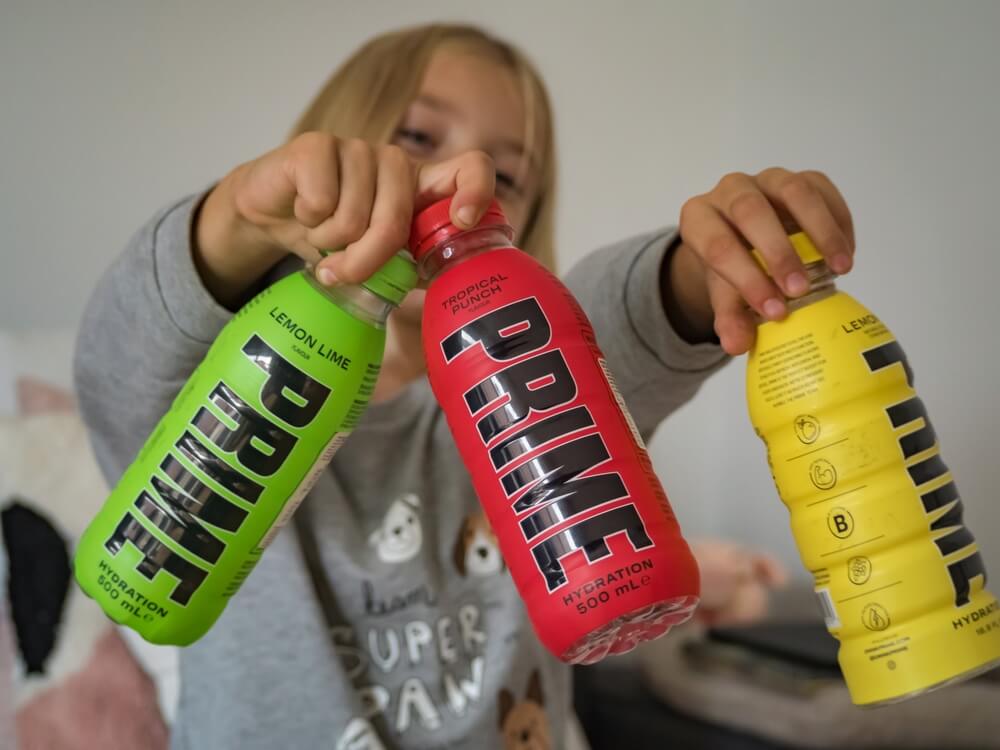
24K-Production/Shutterstock.com
There are several different reasons why Prime Energy and Prime Hydration drinks should not be consumed by children.
When it comes to Prime Energy, the reasons are obvious. These drinks contain far too much caffeine for children to consume, way above the daily recommended limits. There are many potential short and long-term health risks of giving kids caffeine, affecting sleep, cognitive abilities, and concentration, and in the worst cases, high amounts of caffeine can even be fatal.
Regarding Prime Hydration drinks, the risks are less obvious and severe, but still present. It doesn’t pose the same caffeine-related risks as Prime Energy. However, it still contains lots of additives and artificial sweeteners, which may be risky and detrimental to health. In addition, Prime Hydration drinks are often seen as a “gateway” drink, which could encourage kids to try Prime Energy, too.
It’s also important to be aware of the potentially harmful effects of sugar-sweetened beverages (SSBs) on children’s health. As a 2018 study reveals, frequent consumption of these drinks contributes not only to obesity but also to insulin resistance, which can lead to different health issues and an increased risk of dental caries. Health experts have consistently highlighted the connection between SSB consumption and weight gain in children, calling for increased research into exactly just how harmful these beverages are both in terms of physical and behavioral effects.
What Do Experts Say About Prime Drinks and Kids?
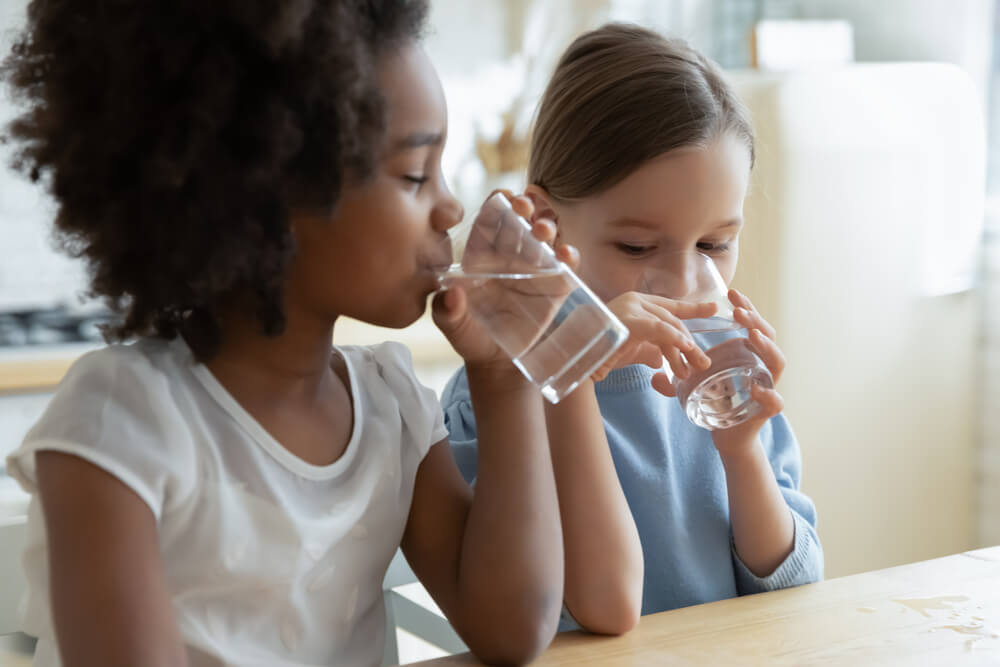
fizkes/Shutterstock.com
Health professionals agree that while Prime Hydration may seem like a better alternative to traditional sugary energy drinks, it is not an ideal choice for children. Dr. Jane Doe, a pediatric nutritionist, emphasizes, “Water remains the best hydration option for kids. Drinks with artificial sweeteners and preservatives should only be consumed occasionally.”
Nutritionist Hannah Macey highlights that although Prime contains 10% coconut water and electrolytes, its benefits are overstated. She explains, “Prime includes artificial sweeteners like sucralose and acesulfame potassium, which can disrupt gut health and potentially lead to metabolic issues.” Moreover, the BCAAs in Prime are present in minimal quantities and don’t provide significant nutritional advantages.
Judy More, a specialist in child nutrition, advises parents to opt for milk or water over Prime. She warns, “Prime’s hydration drinks contain preservatives and sweeteners, and its energy drinks are loaded with caffeine. The high caffeine content and other ingredients can be harmful to children’s overall health and dental well-being.”
Ultimately, experts recommend that parents limit the consumption of beverages like Prime and focus on healthier, natural hydration options such as water, milk, and homemade electrolyte drinks. These choices provide necessary nutrients without the additives or potential risks associated with trendy commercial drinks.
Real Prime Reviews from Parents
- “I don’t let my child drink Prime Energy, despite the peer pressure from her friends. I don’t believe the ingredients are good for her.”
- “My kids were excited to try it, but didn’t enjoy it at all.”
- “Overly saturated with sucralose.”
- “I view Prime as a treat for my children. I certainly wouldn’t let them drink it every day.”
- “Way too sweet. Geared towards kids who really don’t need energy drinks or sugar.”
What If My Child Is Obsessed and Really Wants to Try It?
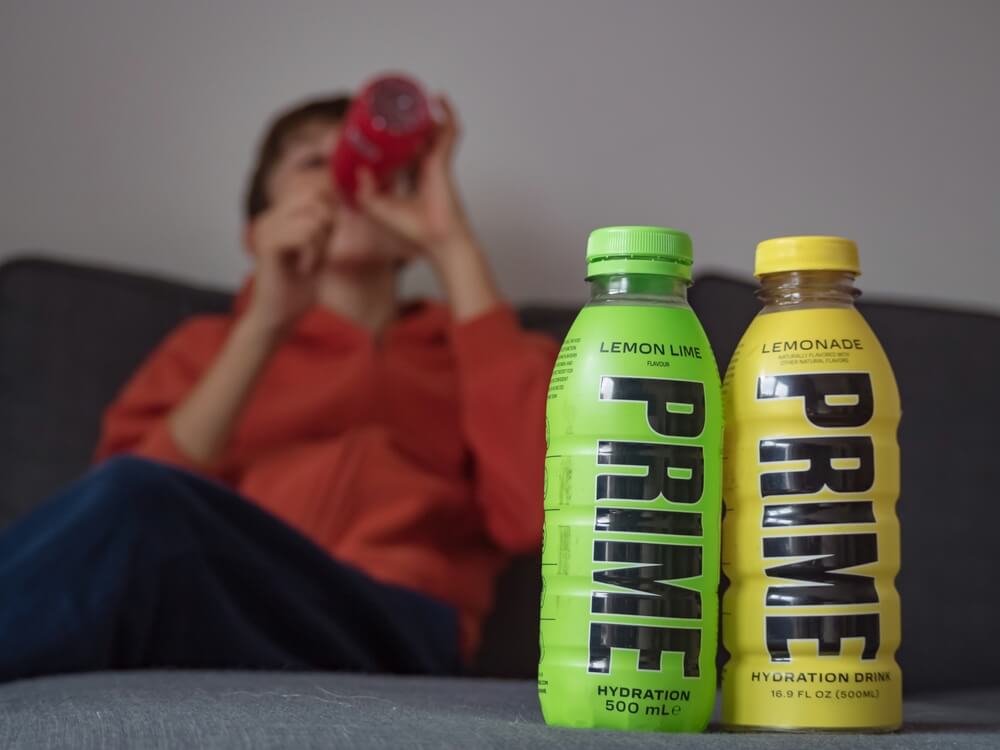
24K-Production/Shutterstock.com
Ideally, parents should avoid letting their kids try Prime drinks of any kind. The drinks are unsuitable for children and pose a lot of possible health risks. However, given the popularity of the YouTube stars behind the brand and the huge levels of peer pressure among young people to try the same things that their friends are trying, it can be hard to stop them.
If your child is really obsessed with Prime and wants to give it a try, it’s up to you to decide whether or not to allow it. Given that Prime Hydration is a lot safer than Prime Energy, you could let your child try some of that, in a small amount, just to see what it’s like. Alternatively, you could explain the risks and give your child alternative beverages instead.
Ensure your child’s safety both online and offline! Download the Findmykids app now to keep track of their location, set safe zones, and receive instant alerts. Embrace peace of mind as a parent with Findmykids—your ally in ensuring your child’s security!
What Are the Healthiest Hydrating Drinks for Active Kids?
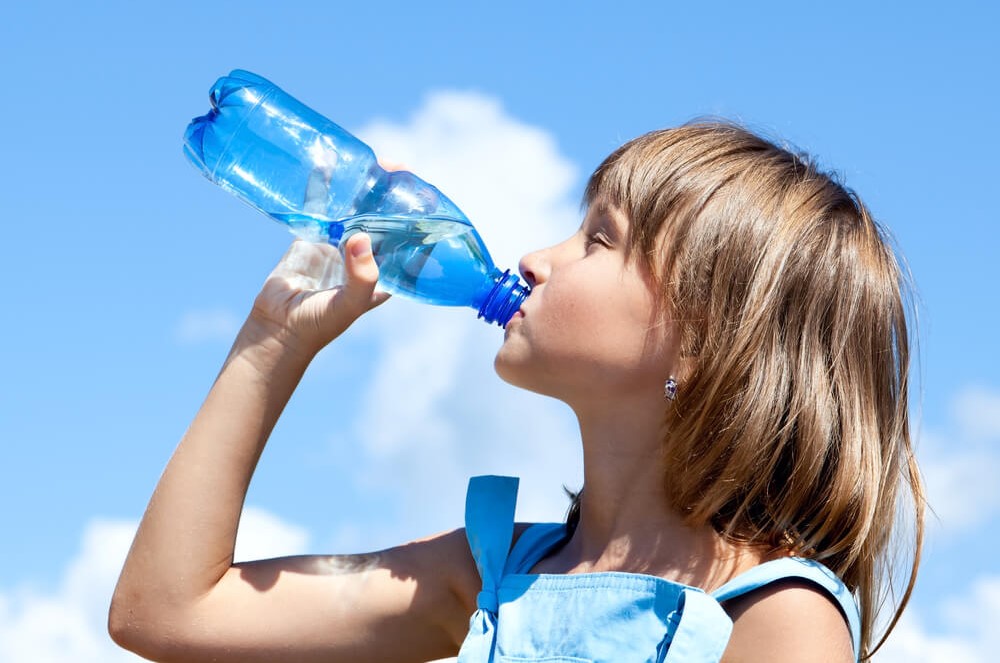
Maxim Blinkov/Shutterstock.com
Staying hydrated is important at any age, and kids should be given all the hydrating beverages they need to stay happy and healthy, especially on hot days or when engaging in exercise. However, instead of opting for sports drinks filled with caffeine and additives, like Prime, parents can opt for healthier options.
The healthiest hydrating drink of all is simply water. Good old H2O is all children really need to hydrate their bodies effectively, and it should be the main thing that they drink throughout the day. You can also offer them homemade electrolyte drinks after periods of intense physical activity, as well as fruit juices (or even just whole fruits and veggies, like oranges and cucumbers).
Coconut water is another safe and healthy source of hydration, but avoid brands that add sugar and extra additives, opting for pure and simple coconut water instead.
Be Cautious When Giving Prime to Children
Overall, it’s clear to see that Prime drinks—while hugely popular and hyped up to children—aren’t the healthiest beverages on the market. They may be aimed at a young crowd in their marketing, but they’re actually not even suitable for kids to consume. It’s therefore important for parents to be aware of the risks and generally avoid giving Prime and similar drinks to children, whose bodies simply aren’t equipped to deal with such high levels of caffeine and additives.
FAQs
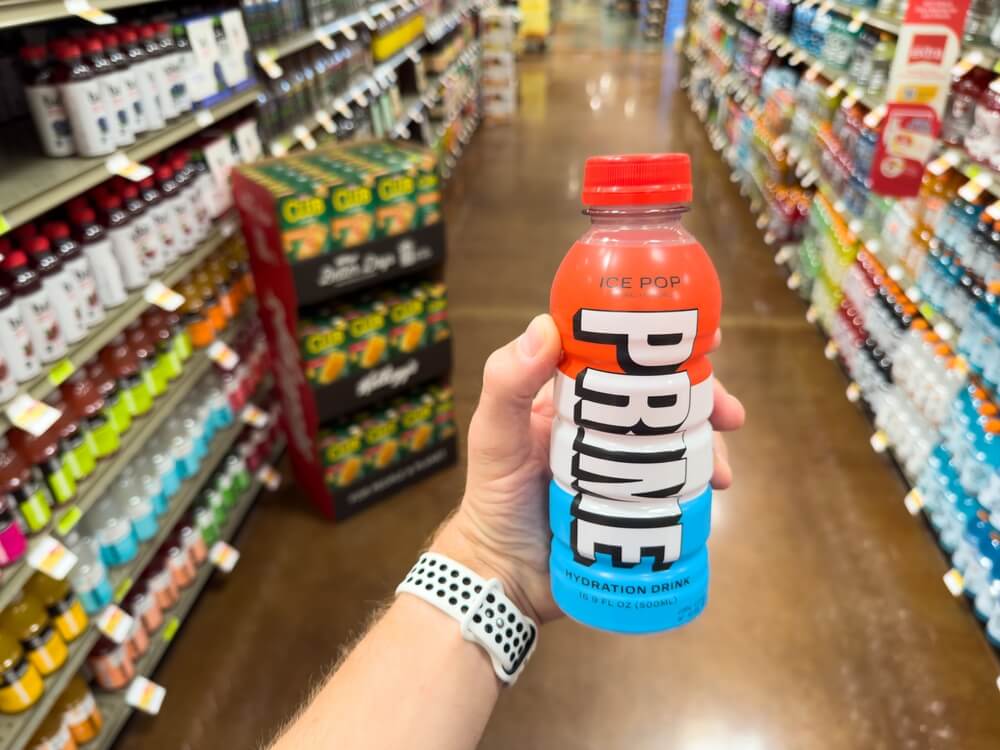
ZikG/Shutterstock.com
Is Prime Hydration safe?
In general, these sports hydration drinks are safe. However, they aren’t suitable for everyone. The label indicates that children can only trick it once they turn 15 due to potential health risks. Overusing Prime Hydration drinks might lead to digestive issues, so it’s important to follow the recommended advice on using these to avoid adverse effects.
Is Prime good for kids?
Prime drinks are not recommended for kids, especially Prime Energy, which contains 200 mg of caffeine—an amount considered unsafe for children and teens and clearly labeled as not suitable for under 18s. Even Prime Hydration, which is caffeine-free, isn’t ideal for kids due to its unbalanced electrolytes, added BCAAs, and vitamins that most children don’t need. The brand itself advises against use for children under 15, and health experts generally recommend water or age-appropriate, low-sugar sports drinks instead.
Is Prime drink healthy?
No, Prime drinks aren’t considered healthy. They contain lots of artificial sweeteners, which could be harmful to health in large doses, and Prime Energy is packed full of caffeine, making it unsafe for young people to drink.
What is the big deal with Prime Drink?
The buzz around Prime Drink primarily revolves around its rapid rise in popularity, driven by its founders, Logan Paul and KSI, both of whom have massive online followings. This popularity has sparked intense interest among children and teenagers, leading to shortages in stores. The concern is that while Prime drinks are marketed as hydration solutions, their significant caffeine levels and the marketing strategies targeting younger audiences may pose health risks. Parents are increasingly questioning the suitability of these drinks for children, particularly in light of the growing evidence surrounding caffeine consumption in minors
Can a 12-year-old drink coffee?
Experts recommend that children from 12 to 18 may consume coffee or caffeinated drinks, but only in doses of up to 100mg of caffeine a day. That’s the equivalent of around one standard-size cup of coffee.
Is Prime healthier than Gatorade?
In terms of sugar content, yes. Gatorade contains large amounts of sugar in each serving, while Prime only uses artificial sweeteners, making it less sugary. However, neither of these drinks is particularly healthy, and both pose health risks.
What is the Prime drink age limit?
The age limit for Prime Hydration is 15, while the limit for Prime Energy is 18. That means that nobody below either of those age limits should consume these beverages. They’re not suitable for children or young teens, and Prime Energy isn’t suitable for teens of any age.
Why is Prime getting a lawsuit?
Prime is facing legal scrutiny due to allegations regarding misleading marketing practices and the caffeine content in its drinks. Some parents and consumer advocates have raised concerns that the levels of caffeine in Prime Energy drinks may not be clearly communicated, potentially leading to excessive consumption by children. This situation has prompted a lawsuit aimed at holding the brand accountable for any potential health risks associated with its products, particularly for younger consumers.
The picture on the front page: Jiri Hera/Shutterstock.com
Проверьте электронный ящик
















